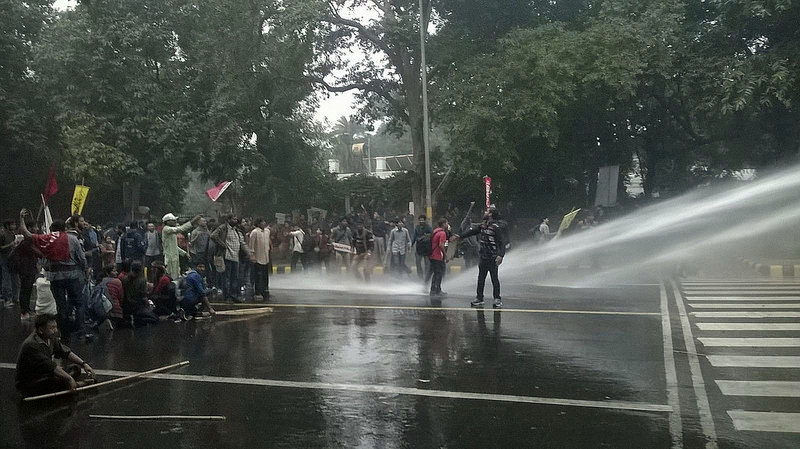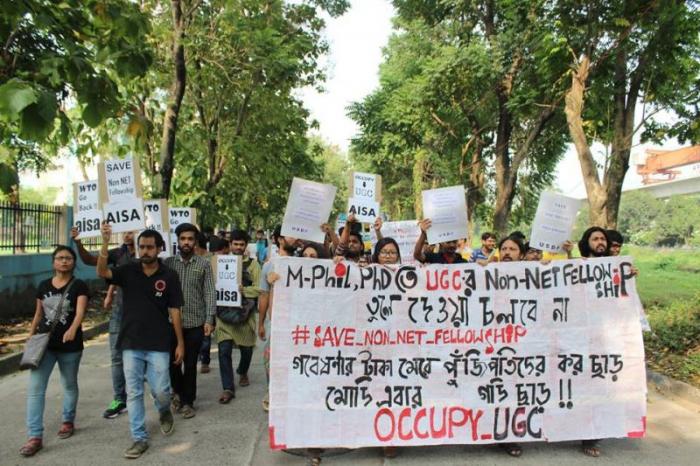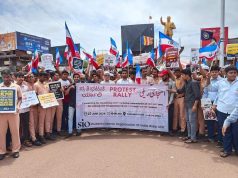For the last two months, students from Jawaharlal Nehru University (JNU), Delhi University (DU), Jamia Millia Islamia and Ambedkar University, Aligarh Muslim University, AMU, New Delhi and other universities have been protesting against the UGC. Their demand is to restore non-NET fellowship to all MPhil and PhD research scholars. Among other demands include extension of fellowship to students of other state universities.
At present, a student gets Rs5,000 (during their MPhil) and Rs8,000 (during PhD) under this scheme. It is to be borne in mind that the duration of the scholarship is for five years. Since the Modi government came to power, the budget on education and other social sectors have been cut drastically, stoking protests in the streets. The on-going protests by JNU students, better known as “Occupy UGC”, is one such strong voice against the anti-people policies of the government. The government, unfortunately, instead of heeding the grievances of students, are resorting to brutal methods to suppress them. For example, JNU students leading Occupy UGC Movement have been lathi-charged and tear gas and water-cannon have been used against them. Praveen, a protester from JNU, alleged that “many of us were beaten by the police and injured, despite the fact that we were taking out the march peacefully.”
Moreover, their agitation assumes significance as the world leaders arrive in Nairobi, capital of Kenya to participate in the tenth ministerial meeting of World Trade Organisation (WTO). The WTO meeting began in Nairobi on December 15
According to the protesters, police cracked down on the students and several of them were rushed to hospital after sustaining severe injuries. According to media reports, many women students also sustained injuries. However, the police crackdown failed to deter the spirits of protesters and the number of students taking to streets gradually swelled. The large chunk of protesters belonged to several universities. Prominent among them are JNU, DU, Jamia Millia Islamia, Ambedkar University, Allahabad University, Jadavpur University, Aligarh Muslim University, Haryana University and Panjab University. These protesters have given a ‘national mobilisation call’ for students of the country to unite against the cut on fellowship.
Moreover, their agitation assumes significance as the world leaders arrive in Nairobi, capital of Kenya to participate in the tenth ministerial meeting of World Trade Organisation (WTO). The WTO meeting began in Nairobi on December 15, and socialist economists fear that the meeting would prepare an agenda to unleash another programme on cut on welfare measures. According to Left critics, the process of fund cuts on education and privatization of education in India is a part of the WTO agenda.
After the coming of the right-wing Modi government with the backing of corporate sectors, the intensification of privatization has begun.For example, the budget on education is being reduced. Such policies, Left economists fear, will have an adverse impact on the people of India, particularly those who are deprived of basic amenities. The Left has for a long time been making demands for increased government budget for educational institutions. Contrary to such demands, the government wants to tailor the syllabus to suit the needs of the market and wants to withdraw investments from education sectors gradually, making courses self-financed.
The government’s decision to cut non-NET fellowship is a part of such a design from the academic year 2016-17. The UGC thus decided to discontinue the fellowship on October 7, saying that the scheme of fellowship lacked accountability and transparency. This decision angered students to such an extent that they gheraoed the UGC building at ITO in New Delhi. Until the time of writing the story, the occupation continues. A few days later, a delegation led by JNU student union met HRD minister Smirti Irani, asking her to give assurance in writing that the new policies would be revoked. The BJP-affiliated student wing ABVP has not only turned their back on the agitating students, but has also colluded with the government. For instance, the ABVP is spreading news that the HRD ministry has already changed its position and the non-NET fellowship will continue as usual. However, the protesters argue that the HRD ministry, instead of giving any assurance in writing, is going to introduce criteria that will make a large number of students ineligible for the fellowship.






